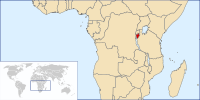Portal:Burundi
The Burundi PortalA view of Bujumbura, Burundi
Burundi (/bəˈrʊndi/ ⓘ, /-ˈrʌn-/), officially the Republic of Burundi (Kirundi: Repubulika y’Uburundi,[1] [u.βu.ɾǔː.ndi]; Swahili: Jamuhuri ya Burundi; French: République du Burundi}}, [buʁundi] or [byʁyndi]), is a landlocked country in the Great Rift Valley where the African Great Lakes region and East Africa converge. It is bordered by Rwanda to the north, Tanzania to the east and southeast, and the Democratic Republic of the Congo to the west; Lake Tanganyika lies along its southwestern border. The capital cities are Gitega and Bujumbura, which is also the largest city.[2] One of the smallest countries in Africa, Burundi's land is used mostly for subsistence agriculture and grazing, which has led to deforestation, soil erosion and habitat loss.[3] As of 2005 the country was almost completely deforested, with less than 6% of its land covered by trees and over half of that being commercial plantations.[4] In addition to poverty, Burundi often suffers from corruption, weak infrastructure, poor access to health and education services, and hunger.[5] Burundi is densely populated and many young people emigrate in search of opportunities elsewhere. The World Happiness Report 2018 ranked the nation as the world's least happy with a rank of 156.[6] Burundi is a member of the African Union, Common Market for Eastern and Southern Africa, United Nations and the Non-Aligned Movement. Selected article -Pierre Buyoya (24 November 1949 – 17 December 2020) was a Burundian army officer and politician who served two terms as President of Burundi in 1987 to 1993 and 1996 to 2003. He was the second-longest-serving president in Burundian history. An ethnic Tutsi, Buyoya joined the sole legal party, UPRONA and quickly rose through the ranks of the Burundian military. In 1987, he led a military coup d'état that overthrew his predecessor Jean-Baptiste Bagaza and enabled him to seize power. Leading an oppressive military junta, Hutu uprisings in 1988 led to the killings of an estimated 20,000 people. Buyoya then established a National Reconciliation Commission that created a new constitution in 1992 which allowed for a multi-party system and a non-ethnic government. Running as a candidate in the 1993 Burundian presidential election, he was defeated by Hutu candidate Melchior Ndadaye of the FRODEBU opposition party. (Full article...) General images -The following are images from various Burundi-related articles on Wikipedia.
More Did you know (auto generated)
Did you know -
Wiki Loves Africa in Burundi
CategoriesRelated portalsWikiProjectsSelected picture -TopicsAssociated WikimediaThe following Wikimedia Foundation sister projects provide more on this subject:
Sources
Discover Wikipedia using portals | ||||















































